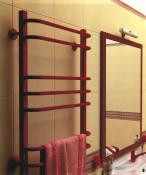Search
Login
How to heat a house using a heat pump, what is a heat pump
Heat pumps are increasingly attracting the attention of builders and owners of private houses, heating with a heat pump is very economical and convenient to use. The heat pump allows you to gain almost complete independence from rising prices for gas, oil and coal; for proper operation, the pump consumes only a small amount of electricity. Clean heat will come from soil, air or water, depending on the type of device. Considering this type of heating, many questions arise about the operation of the heat pump; you will find answers to the most important in this article.
Content
- What is a heat pump? video
- The principle of operation of the heat pump
- Types of Heat Pump video
- The economic benefits of heating a house with a heat pump
- Heat pump benefits
What is a heat pump?
A heat pump is a device that generates energy from natural resources such as water, soil or air. This energy is converted from electrical to thermal energy in a ratio of 1: 5. The increase in energy is generated by increasing the pressure achieved by the electric drive of the compressor. The heat pump can be compared with the operation of the refrigerator, only in this case the room is heated, and for this a higher power is achieved.
The heat pump includes an evaporator, compressor, expansion valve and condenser. A refrigerant derived from lower energy sources circulates in a confined space and releases this energy through a condenser designed for heating and hot water supply.
The principle of operation of the heat pump
Is it possible to heat a house without burning wood, coal or gas? The heat pump is based on the fundamental law of physics, without a combustion process that releases the chemical energy stored in the fuel.
The very principle of a heat pump is similar to the process of pumping a regular basketball with a hand pump. We all know that when pumping, the pump heats up, this is because the compression of the air leads to an increase in temperature. Cool air is compressed to high heat and discharged into the building, then the process is repeated. This cycle is called thermodynamic closure (or Carnot cycle).
Also, the heat pump is an excellent heat exchanger. In summer, when the outside air heats up to a temperature above 25˚C, the heating system can automatically become a source of free cooling.
Types of Heat Pump
Three main types of heat pumps are available on the market. They differ in the way they produce heat - from air or water. About each more.
Air-water heat pumps are actually electric heaters with a heat pump, but compared to traditional electric water heaters, an air-to-water pump significantly saves the family budget.
If the ambient temperature drops, the pump takes energy from the air and starts the heater, warming the water to the optimum temperature. In winter, at low temperatures, the system completely switches to electric heater mode.
Water-to-water heat pumps draw energy from groundwater and are installed only in places where they are. Installation of this type of pump is complicated by the drilling of two wells and a decrease in pump performance at -10 degrees.
The least complex installation of heat pumps is air-to-air, as the name implies, the source of thermal energy is outdoor air. This is the easiest and cheapest pump to install. The pump is installed on the external or internal part of the house, the internal installation will extend its service life, as the pump will be protected from the weather. The air pump works even at -20, but does not heat water like a water-air pump, but is intended only for heating a house.
The economic benefits of heating a house with a heat pump
When considering buying a heat pump, you must first evaluate the costs in the long run given the ever-increasing prices of gas and electricity. Given the depletion of fossil fuels, a heating heat pump can indeed be a very profitable solution. A pump receives 75% of its energy from air or water, and only 25% is generated by a compressor powered by electricity.
High-performance heat pumps with 1 kWh of electricity produce up to 5 kW of thermal energy, these indicators prove efficient operation and savings for home residents. Remember, the heat pump has a number of adjustable parameters that affect the correct distribution of energy resources without harming your means.
The cost of water pumps varies depending on the manufacturer, series and installation method. The heat pump whose price may be more than 500,000 rubles. pays off on average in 5 years, without causing any problems to its users for a long time.
Heat pump benefits
Using a modern heat pump has several advantages:
-
Heating without firewood or gas
-
Safe and silent operation
-
Operational reliability up to 25 years
-
No annual maintenance needed
-
Summer room cooling
-
Work without smoke, dust and emissions of harmful substances into the atmosphere
-
Energy saving
-
Low upfront costs
-
The increase in the value of the building due to its own energy source
-
The cheapest type of heating, even in comparison with gas - saving about 30%





